By Al Pickett, special contributor
Up Hobbs way, a radiator magnate is paying it forward as he and his charges keep their clients’ motors cool and collected.
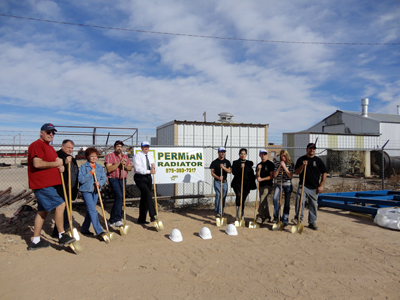 When Permian Radiator Service and Supply broke ground on a new building recently in Hobbs, N.M., it was just another example of the impact that the booming oil and gas industry has on the rest of the economy.
When Permian Radiator Service and Supply broke ground on a new building recently in Hobbs, N.M., it was just another example of the impact that the booming oil and gas industry has on the rest of the economy.
Darby Vaughn, the owner of the Permian Radiator, said he hopes to be in his new facility by the end of January.
“We are busting at the seams,” Vaughn said of his current facility.
So what does a radiator shop have to do with the oil and gas industry? Well, according to Vaughn, a lot. If a motor is needed in the oil field, a radiator is needed to cool it. Whether it is on a frac truck, a pulling unit, a drilling rig, a pickup truck, or industrial mining equipment, radiators are put through the rigors of operating in extreme heat and dusty conditions, not to mention the wear and tear of bouncing down rough wash-boarded oilfield roads.
Someone has to replace or repair those radiators, and in Lea County and that part of southeastern New Mexico and far West Texas, that falls to Vaughn and his four employees who are working around the clock to keep up with the bustling oil field economy.
Vaughn, who brought the business four years ago, back when it was known as Ken’s Radiator, said he has been blessed, acknowledging that 16 years ago he was homeless, living on the streets in Hobbs, Houston, Midland, Odessa, Beaumont, Denver, Wichita Falls—even Gillette, Wyo.
“This is God’s deal,” he asserted. “It’s God’s radiator shop, and he just gives me a chance to mess it up. [Laughter.] Of course, I have busted my butt, but I have never had to worry about business.”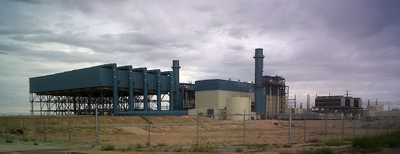
He says he was “on his way to this point” before he got sidetracked with alcohol and drugs. “For about five years I just really didn’t care. I’ve always worked, though, wherever I was. I found spot jobs and things like that.”
He has found some fine and supportive folks along the way, as well.
“I met him [Vaughn] through the radiator business,” said Angel Salazar, one of Vaughn’s customers and friends. “He used to come by and try to get some business from us. I got to liking Darby. He’s real polite. He had had a drug problem and he told me his story. This was back before he bought the shop—he just worked there. One time he showed up at my business and told me he had an opportunity to buy the radiator shop. But he said, ‘I just don’t have the money.’ I told him, ‘I’ll lend you the money—because I know you’re going to make it.’”
With Salazar’s help, and some owner-financing from Jim Tippy, Vaughn’s boss and then-owner of the shop, Vaughn took the plunge. He has since completely paid off Salazar and is on his way to paying off Tippy.
“I give him all my radiator business now,” said Salazar, who with his brother, Jesus, owns two businesses: Hobbs Diesel and United Drilling. The drilling outfit runs about ten rigs “pretty steady.”
For his own part, Vaughn is humble and grateful. “When I went to Angel about buying the shop, he said, ‘Go get it and don’t look back.’ He showed faith and he knew my past.
“Until this groundbreaking a bank wouldn’t touch me,” he added. “Now I have banks courting me all over the place.”
Tippy, the former owner of what is now Permian Radiator, said he had learned to put his trust in Vaughn, his erstwhile employee.
“I knew he had been in the business most of his working life,” Tippy said. “He’s grown the business since acquiring it. Expanding the way he is now—I’m tickled about it.
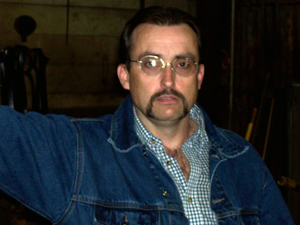 “Darby is a good guy,” said Tippy. “He means what he says and he’s easy to get along with. He’s a hard worker, very loyal. He knows that his experiences in life have helped him be ready for what is going on now. He’s done nothing but elevate himself since the times he went through, and today he helps other guys along—guys who have had the same problems.”
“Darby is a good guy,” said Tippy. “He means what he says and he’s easy to get along with. He’s a hard worker, very loyal. He knows that his experiences in life have helped him be ready for what is going on now. He’s done nothing but elevate himself since the times he went through, and today he helps other guys along—guys who have had the same problems.”
Vaughn has been active helping individuals transition from a halfway house into regular life. “I try to teach them a trade,” he said.
“Life is a very, very fragile thing that we hold in our hands, and it is not something to be taken lightly,” Vaughn said. “If a man wants to talk to me about recovery, I don’t have the right not to. Everybody’s time is precious. Donald Trump doesn’t have any more time than me.
“There was a time when nobody wanted to talk to me,” he continued. “So when somebody does, I take it as an honor. If someone seeks advice from me, I take it as an honor. I can remember that feeling of hopelessness and despair, when I just really wanted to talk to someone.”
Vaughn said he has no use for the term “oil field trash.”
“I don’t believe in that. I believe people in the oilfield are high-class, hard-working people who, when they get home from roughnecking or running casing or from Halliburton or some job like that, that most of them put their baby on their lap and they turn to the TV and watch whatever it is Mama wants to watch. And it will probably end up being Twilight [laughs] or something like that. They’re the genuine article. They actually care. And they’re family oriented.”
There’s a touch of the contrarian in him. As an aside, Vaughn proudly notes that he’s a stockholder in the Green Bay Packers, a distinction not common encountered in the windswept reaches of southeastern New Mexico.
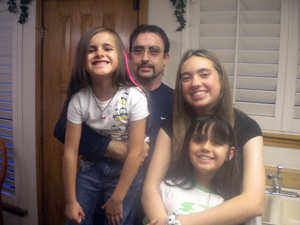 “I always had the Dallas Cowboys shoved down my throat, so I became a Packers’ fan,” he chuckles. “Several years ago, when they sold more stock to finance renovations to their stadium, I bought two shares.”
“I always had the Dallas Cowboys shoved down my throat, so I became a Packers’ fan,” he chuckles. “Several years ago, when they sold more stock to finance renovations to their stadium, I bought two shares.”
When he’s not espousing Vaughn-isms (examples: “It was built, not grown—we can fix it.” “Class never goes out of style.” “Good enough isn’t good enough—it’s gotta be good.”), Vaughn is tinkering with radiator hardware of some kind or other.
It is the challenge of doing work on unusual radiators than Vaughn finds especially satisfying. For example, the radiators on frac trucks, which can be as large as 16 feet by 10 feet, are too tall to stand upright on the trailers, so they have to sit horizontally.
“They are huge two-stage radiators,” he said.
That is one reason why Vaughn is building a new building, which will have an 18-foot hook height in it to accommodate those giant radiators. The 40-foot by 60-foot structure will be a “heavy-duty building,” according to Vaughn, and will include a five-ton hoist.
“There is nothing we can’t handle,” he claims. “If there anything larger than that, we will have to do it on location.”
Vaughn said he does a lot of work for Baker Hughes as well as numerous other service companies and drilling companies, including United and McVay.
If a rig is sitting over the hole and the radiator fails, that lost time is money to the customer. So Vaughn said he keeps spare radiators in stock, meaning he can replace the radiator immediately and then later repair the failed radiator.
“They can take the radiator off, pick one up, and the only time they are down is the time it takes to remove and replace it,” he said.
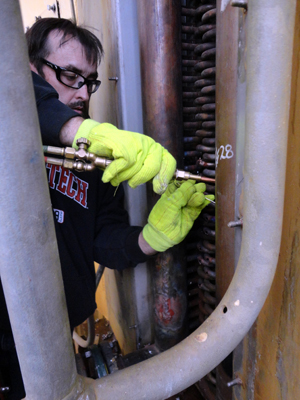 Vaughn related that about half of his company’s business is selling new radiators, while the other half is repair work.
Vaughn related that about half of his company’s business is selling new radiators, while the other half is repair work.
According to the company’s Web site, Permian Radiator provides new radiators, remanufacturing of used radiators, and the repair of radiators for any auto, truck, or industrial equipment application that utilizes an internal combustion engine or hydraulic system, including automotive radiators and heater cores, agriculture cooling systems, oil well servicing unit, oil well drilling rigs, compressor stations, water flood stations, semi-truck tractor and deck engines, standard soldered cores, individual grommet tubes, and oil coolers for any application. Vaughn said they will also pick up and deliver at no extra charge.
Jonathan Wagner, who is shop foreman for Permian Radiator, said the fun part of his work on such a variety of different radiators is the unpredictability of what each day will bring.
“You ought to see the ways people have tried to fix a hole in the radiator in the field—with bubble gum, tampons, soda cans, and pop bottles,” he laughed. “We work on a variety of radiators, from one used on a dirt bike that can fit in the palm of your hand to one that is 12 feet by 14 feet on a drilling rig.”
Much of the work Wagner does is replacing fans that break, he said, because of vibration or a loose clutch. Not only does he repair radiators, he can also re-core them by bolting on and soldering a new tank.
Maybe the most unusual radiator repair work that Permian Radiator has done is at the power plant near Hobbs that takes natural gas from the Permian Basin oil and gas industry and uses it to generate electricity.
“The ambient air is too warm in the summer and the chiller coils that cool the water before it goes into the turbine freeze up,” he explained.
Because of the mining work that includes land reclamation in the area, Permian Radiator also works on large radiators on 10-foot Caterpillar scrapers and bulldozers. The company’s work is not limited to just radiators on big equipment, however.
“The automotive part of business is there, too,” he adds. “We keep radiators in stock.”
The biggest reason for radiator failures is not on the job, however, according to Vaughn. Instead, it is the rigs twisting and turning and hitting pot holes on the rough oil field roads that cause problems for the fragile radiators.
“We build our own style Detroit 60 Series radiator for pulling units,” he points out. “We are the only one to build it that way. They don’t fail on the job. Of course, they also have to stand up to emission regulations. You have to be on top of that. You also have to worry about weight. You are always looking for ways to build one that is lighter but will still stand up. We have never compromised on the quality of our work. There is a saying that goes ‘If you want to go cheap, you better buy two of them.’”
Vaughn proudly claims that Baker Hughes didn’t have a single one of the radiators that his company built go down last year because of the heat.
“You can’t argue with results,” he says. “We appreciate our customers. From the customer that just needs a radiator on his personal car to the big companies with giant radiators on drilling rigs or frac trucks, I am here to answer the phone the same. Service is what we do.”
What advice does he have for others who’d like to launch their own service business?
“All I can say is, if you want to go home at 5:00 o’clock, you’re not going to make it,” he said. “You’re going to have to work and you’re going to have to ask yourself how bad do you really want it. You have to want to be able to be your own boss. Which really is nice, by the way. And one other thing: We all make mistakes. If you get the opportunity, grab it and go.”
His biggest satisfaction today? His improved life with his kids.
He went through a harsh, difficult divorce—obviously, from his past—and yet Vaughn is pleased that his kids call him “all the time.” They send him photos of his grandbabies on a daily basis.
“This is the stuff that I cherish—just being able to have a business and have my kids call me Dad. They’ve always called me Dad, really, but I am not just that son-of-a-gun out on the street. I am somebody they call for advice. It is an awesome feeling. That is the rush that we get—the one that replaces the rush we used to look for. Whenever you help somebody, like when I am helping a young man get sober and the lights come on in his eye—that is also the rush that replaces the other rush. That’s what keeps you coming back—period.”










